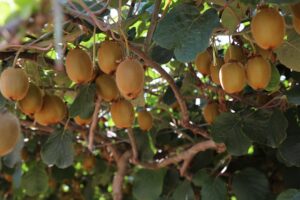3 Reasons My Blueberries Aren’t Ripening
It’s possible that blueberries are so delicious that you’ll want to consume them on a daily basis. In addition to being delicious to eat on their own, they may also be used to create a variety of delectable delicacies in the kitchen!
If blueberries are among your favorite fruits, you may want to try starting a blueberry orchard in your yard or backyard. The ability to gather blueberries when they’re ripe will enable you to create a great pie or just enjoy some simple blueberries as an appetizer.
You will be disappointed if you are cultivating blueberries and your harvest does not turn out as well as you had intended. Some people have complained that they are having difficulty getting their blueberries to mature correctly.
Is it any surprise that blueberries are having difficulty maturing? Does this seem to be caused by anything you’re doing wrong?
Continue reading to find out why this may happen and what you can do to prevent it from happening again. Your blueberries should be ready soon enough, so get started enjoying them!
3 Reasons My Blueberries Aren’t Ripening
It Might Be a Case of Natural Selection
Firstly, it’s important to understand that it’s possible that this is a natural occurrence. A cultivar that ripens later than typical may be found among the many various sorts of blueberries available for sale.
There are certain blueberry varieties that mature later in the season than others, which are not well known. Although certain fruits may naturally begin to mature in the late summer and early fall, others may remain green until the first few weeks of the season.
In some respects, this might be annoying, but you may only need to be patient for a short period of time. Try to determine the kind of blueberry you have planted if as all possible.
The fact that the blueberry cultivar you’ve planted is one that ripens late will relieve you of any concerns about the timing of fruit harvest. The only thing you’ll have to do is wait for the blueberries to ripen completely before picking them.
Keep in mind that blueberries ripen at different times of the year.
When it comes to collecting blueberries, it’s really rather usual for individuals to make a mistake. Your blueberries could not be ripening correctly because you don’t know when they should be picked, leading you to believe they aren’t.
As previously said, some blueberries will be ready by the end of the summer or the beginning of the fall season.. In certain cases, depending on the variety of blueberries you planted, they may be ready to pick as early as June.
It’s in your best advantage to search up precise facts on blueberries before you start. The information provided will enable you to estimate the approximate time period during which the blueberries will be ready for harvest.
Between June and August, several cultivars will be ready for harvest. You may have had to wait until September or early October if you managed to obtain one of the cultivars that mature late, so keep that in mind if you acquire one of them.
In other words, it’s possible that you won’t have any issues after all. Depending on the circumstances, you may be able to just wait and observe whether the blueberries mature as they should.
It’s possible that the blueberries aren’t getting enough sun.
How much sunshine do your blueberries receive? Depending on how much shade the blueberries are getting, they may have a difficult time ripening in the traditional manner.
For them to mature properly, it may be essential to expose them to a little extra sunshine. Consider pruning any trees and shrubs that may be obstructing the sun’s ability to reach the blueberries.
The blueberries should mature if you are able to make the necessary adjustments and guarantee that light is reaching the appropriate locations. There is something wrong when the blueberries aren’t ripening at all, and you need to remedy the situation immediately.
We are hoping that increasing them exposure to light may help them. Otherwise, it is possible that something else is at fault.
The climate in your area is too hot.
If you are unfamiliar with blueberries, this may sound unusual, but unless you reside in a climate with colder temperatures, you may not be able to get satisfactory results. As it turns out, blueberries have developed in such a way that they need a time of chilling before they can fruit properly.
In the event that you reside in a warm section of the planet, it is possible that blueberries may not mature adequately in your location. Keeping blueberries at temperatures below 45 degrees Fahrenheit for an extended period of time is necessary.
Because of the shortening of the chilling time, the berry development will not take place as anticipated. If you don’t do anything, you’ll have to wait much longer for the ripening to take place.
When the temperature drops below 45 degrees Fahrenheit, it is unusual in many places of North America. If you reside in an area where the temperature is warm throughout the fall and winter, you may need to look for specific blueberries that are only available during these seasons.
Some blueberries may be grown in warmer climates if you know where to look for them. In addition, since these cultivars need shorter chilling times, they will be more suitable for those who reside in milder climates.
There isn’t enough acid in the soil
An additional point to consider is that the soil that you’re working with may not be ideal for growing blueberries at all. Unless you pay attention to the pH balance of the soil, you will not be able to determine if it is sufficiently acidic.
In order to flourish, blueberries need an acidic soil. You can have problems getting your blueberries to mature if you grow them in soil that isn’t sufficiently acidic.
Planting blueberries on soil with a pH level between 4.0 and 4.5 will give you the greatest results possible. Always test the soil before planting blueberries to ensure that you are doing the proper procedures to prepare it for the fruit.
In order to raise the acidity of the soil, it may be required to replenish it with organic materials. Additionally, you should keep an eye on the soil to make sure that the pH level is within acceptable ranges.
It will be much easier to get things right now that you are aware of the necessity to be on the lookout for it. This little error should not prevent you from harvesting your blueberries in the manner in which you had hoped.
Lastly, a word about
Your blueberries may not be ripening for a variety of reasons, including a lack of sunlight. Your skin may be sensitive to sunlight, which is one of the most prevalent symptoms.
Insufficient sunshine will prevent the blueberries from ripening as quickly as they should. Cut back bushes and shrubs that are obstructing the blueberries’ ability to get enough light in an attempt to resolve the problem.
The fact that this does not seem to be the issue suggests that something else is at work in your computer. Another issue that you should investigate is the acidity of the soil.
The proper amount of acidity in the soil is required for blueberry growth. There is a possibility that you will be unable to get your blueberries to mature if your soil’s pH balance is not optimal.
Using a basic soil test kit, you can determine the acidity of the soil. This will help you to guarantee that the pH balance of the soil remains between 4.0 and 4.5, which will allow the blueberries to flourish.
You may just have to be patient at the end of the day. Blueberry varieties that mature later in the year are becoming more common.
It is possible for certain blueberries to mature in the latter days of summer or the first few weeks of autumn, depending on their location. Harvesting standard blueberries will normally take place between June and August, depending on the weather.
When it comes to blueberries, it’s a good idea to keep track of when they should mature. Then when the time comes, you’ll be ready to harvest them from your plot.
9 Effective Bird Deterrents for Your Yard The Most Effective Method for Watering Raised Beds How To Grow Lemongrass In Pots Curled Fuchsia Leaves 3 Reasons Why Are My Irises Not Blooming? 9 Best Tips To Keep Birds Away From Fruit Trees 9 Considerations Before Buying A Robotic Mower WHAT DISTINGUISHES THE RENO NEVADA ZOO FROM OTHERS?




